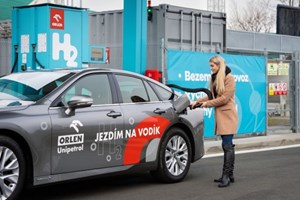News
ORLEN Group launches hydrogen refueling station in Czech Republic
ORLEN Group announced the launch of a new H2 refueling station at the ORLEN Benzina facility in Prague, Barrandov. This station will provide environmentally friendly fuel for cars, trucks and buses in the Czech Republic. Later this year, ORLEN Group will also introduce H2 stations in Poznań and Katowice, allowing drivers in Poland to fill up their cars with eco-friendly fuel. By mid-2025, further ORLEN H2 stations in Bielsko-Biała, Gorzów Wielkopolski, Wałbrzych, Kraków, Piła and Warsaw will be operational. The expansion of traditional and alternative fuels to include H2 is a significant step towards low- and zero-emission individual and public transport. The ORLEN2030 strategy aims to support this development, promoting sustainable solutions for the future.
“As previously announced, we are expanding the availability and range of fuels offered to our customers. The ORLEN Group’s first H2 refueling station in the Czech Republic has already been opened, following a similar facility launched last year in Kraków. This marks a significant step forward in our efforts to develop H2 infrastructure in Central Europe and establish ourselves as a leader in zero-emission transport. Our ultimate ambition is to build over 100 refueling stations in Poland, the Czech Republic and Slovakia by the end of this decade, positioning our network as a crucial component of H2 transport corridors throughout Europe. In doing so, we hope to play a significant role in the region's efforts towards achieving climate neutrality," said Daniel Obajtek, CEO and President of the Management Board of PKN ORLEN.
The ORLEN Benzina filling station located in Prague's bustling Barrandov district is a state-of-the-art, unmanned facility that is open to the public 24/7. What makes it truly exceptional is its ability to cater to H2-fuelled vehicles such as cars, trucks and buses. The station features two dispensers that come equipped with specially designed gun noses that offer a pressure of 700 bar for cars and 350 bar for larger vehicles. This impressive facility was made possible with financial support from the Ministry of Transport of the Czech Republic under the Sectoral Operational Program Transport. ORLEN Unipetrol has set ambitious goals to provide up to 28 H2 filling stations across the Czech Republic by 2030, along with two H2 distribution terminals for rail transport in Litvínov and Neratovice.
The creation of H2 fuel infrastructure constitutes a fundamental component of ORLEN Group's H2 Strategy and is a pivotal aspect of the ORLEN2030 initiative. The company recognizes the pressing need to address the challenges posed by the energy transition and to explore sustainable and eco-friendly solutions. As a substitute for conventional fuels, H2 plays a significant role in the decarbonization process. As per ORLEN's vision, up to 50% of the H2 generated by the company will be low- or zero-emission, with a goal of achieving approximately 80% by 2030 and beyond.
In accordance with ORLEN Group's H2 strategy, over 100 H2 filling stations will be established for road and rail transport in Central Europe by 2030. The H2 fueling facilities will be supplied with H2 from an extensive network of H2 hubs. These hubs will be powered by renewable energy sources and advanced facilities that will convert municipal waste into zero- and low-emission H2. By 2030, the ORLEN Group's total assumed capacity of electrolyzers will be approximately 1 GW of power. This, combined with waste-to-H2 projects, will result in the production of more than 130 kt of renewable H2 by the end of the decade. Furthermore, the company's H2 Eagle project will be instrumental in constructing a comprehensive infrastructure for the production and distribution of low- and zero-emission H2 in Poland. To finance these projects, PKN ORLEN has secured funding from the Innovation Fund, CEF (Connecting Europe Facility), the National Fund for Environmental Protection, and the European Commission's notification for the H2 Eagle project under the IPCEI mechanism.


